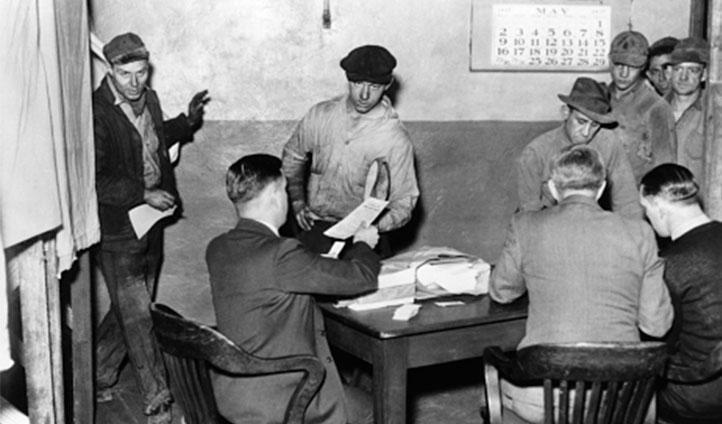Supreme Court Upholds Wagner Act in NLRB v Jones & Laughlin Steel Corp
Historical
In NLRB v Jones & Laughlin Steel Corp, 301 U.S. 1 (1937), the U.S. Supreme Court upheld the National Labor Relations Act of 1935, commonly referred to as the Wagner Act. The decision signaled a turning point in the Court’s review of President Roosevelt’s New Deal legislation.
Facts of NLRB v Jones & Laughlin Steel Corp
The National Labor Relations Act (NLRA) empowers the National Labor Relations Board to prevent any person from engaging in unfair labor practices “affecting commerce.” The term “commerce” is defined to include only interstate and foreign commerce, and the term “affecting commerce” is defined as meaning “in commerce, or burdening or obstructing commerce or the free flow of commerce, or having led or tending to lead to a labor dispute burdening or obstructing commerce or the free flow of commerce.”
The case involved allegation of “unfair labor practices,” which are defined by the Act as restraint or coercion of employees in their rights to self-organization and to bargain collectively through representatives of their own choosing, and discrimination against them in regard to hire or tenure of employment for the purpose of encouraging or discouraging membership in any labor organization. The NLRB specifically alleged that Jones & Laughlin Steel Co. violated the Act by discriminating against employees who joined a union by terminating their employment. The NLRB ordered Jones & Laughlin Steel Co. to rehire the workers; however, the steel company refused. It argued that the NLRA was unconstitutional.
Court’s Decision in NLRB v Jones & Laughlin Steel Corp
The Court held that the NLRA did not violate the Commerce Clause. “The relation to interstate commerce of the manufacturing enterprise involved in this case was such that a stoppage of its operations by industrial strife would have an immediate, direct and paralyzing effect upon interstate commerce,” Chief Justice Charles Evans Hughes wrote on behalf of the majority. “Therefore, Congress had constitutional authority, for the protection of interstate commerce, to safeguard the right of the employees in the manufacturing plant to self-organization and free choice of their representatives for collective bargaining.”
In reaching its decision, the Court addressed Congress’ power under the Commerce Clause.
According to the majority, “acts which directly burden or obstruct interstate or foreign commerce, or its free flow, are within the reach of the congressional power, and this includes acts, having that effect, which grow out of labor disputes.”
As Justice Chief Justice Hughes further explained: “Although activities may be intrastate in character when separately considered, if they have such a close and substantial relation to interstate commerce that their control is essential or appropriate to protect that commerce from burdens and obstructions, Congress cannot be denied the power to exercise that control.”
Previous Articles
SCOTUS Decision in Bowe v. United States Is First of the 2026 Term
by DONALD SCARINCI on February 5, 2026
In Bowe v. United States, 607 U.S. ___ (2026), the U.S. Supreme Court held that Title 28 U.S.C. § ...
SCOTUS Rules State Can’t Immunize Parties from Federal Civil Liability
by DONALD SCARINCI on January 29, 2026
In John Doe v. Dynamic Physical Therapy, LLC, 607 U.S. ____ (2025) the U.S. Supreme Court held that...
Supreme Court to Address Racial Discrimination in Jury Selection
by DONALD SCARINCI onWhile the U.S. Supreme Court has concluded oral arguments for the year, it continues to add cases t...
The Amendments
-
Amendment1
- Establishment ClauseFree Exercise Clause
- Freedom of Speech
- Freedoms of Press
- Freedom of Assembly, and Petitition
-
Amendment2
- The Right to Bear Arms
-
Amendment4
- Unreasonable Searches and Seizures
-
Amendment5
- Due Process
- Eminent Domain
- Rights of Criminal Defendants
Preamble to the Bill of Rights
Congress of the United States begun and held at the City of New-York, on Wednesday the fourth of March, one thousand seven hundred and eighty nine.
THE Conventions of a number of the States, having at the time of their adopting the Constitution, expressed a desire, in order to prevent misconstruction or abuse of its powers, that further declaratory and restrictive clauses should be added: And as extending the ground of public confidence in the Government, will best ensure the beneficent ends of its institution.





